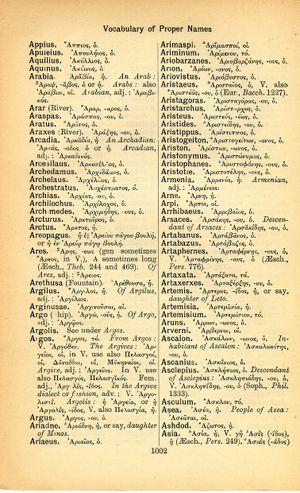Ariminum
ἀλλ’ οὔτε πολλὰ τραύματ’ ἐν στέρνοις λαβὼν θνῄσκει τις, εἰ μὴ τέρμα συντρέχοι βίου, οὔτ’ ἐν στέγῃ τις ἥμενος παρ’ ἑστίᾳ φεύγει τι μᾶλλον τὸν πεπρωμένον μόρον → But a man will not die, even though he has been wounded repeatedly in the chest, should the appointed end of his life not have caught up with him; nor can one who sits beside his hearth at home escape his destined death any the more
English > Greek (Woodhouse)
Ἀρίμενον, τό.
Latin > English (Lewis & Short)
Ărīmĭnum: i, n.,
I a town in Umbria, on the shore of the Adriatic, at the mouth of a river of the same name; the most northern place of Italy proper, connected with Rome by the Via Flaminia, now Rimini, Plin. 3, 15, 20, § 115; Luc. 1, 231; cf. Mann. Ital. I. 455.—Hence, Ărīmĭnensis, e, adj., pertaining to Ariminum: folia, Hor. Epod. 5, 42: ager, Plin. 10, 21, 25, § 50; subst.: Ărīmĭnenses, ium, m., the inhabitants of Ariminum, Cic. Verr. 2, 1, 14; id. Caecin. 35, 112.
Latin > French (Gaffiot 2016)
Ărīmĭnum,¹² ī, n., Ariminum [ville de l’Ombrie] : Cic. Fam. 16, 5, 2 ; Liv. 21, 51, 7, etc. || -ēnsis, e, d’Ariminum : Plin. 10, 50 et -ēnsēs, habitants d’Ariminum : Cic. Cæc. 102.
Latin > German (Georges)
Arīminum, ī, n., Stadt u. gleichn. Fluß in Umbrien, von den Römern kolonisiert, j. Rimini, Fl. Marcochia, Caes. b. c. 1, 8, 1. Vell. 1, 14, 7. Sulp. Sev. 2, 41, 1 u. 45, 8. – Dav. Arīminēnsis, e, zu Ariminum gehörig, ariminensisch, Folia, Hor.: ager, Plin.: synodus, Sulp. Sev.: Plur. subst., Arīminēnsēs, ium, m., die Einw. von Ar., die Ariminenser, Cic.

